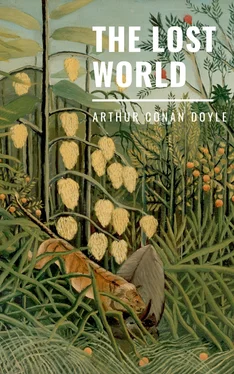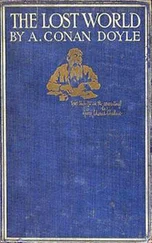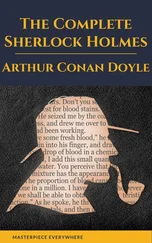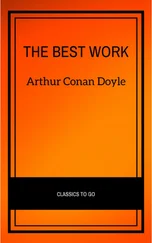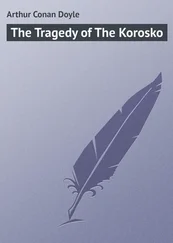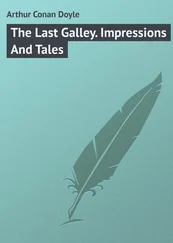"But the American poet?"
"He never existed."
"I saw his sketch-book."
"Challenger's sketch-book."
"You think he drew that animal?"
"Of course he did. Who else?"
"Well, then, the photographs?"
"There was nothing in the photographs. By your own admission you only saw a bird."
"A pterodactyl."
"That's what HE says. He put the pterodactyl into your head."
"Well, then, the bones?"
"First one out of an Irish stew. Second one vamped up for the occasion. If you are clever and know your business you can fake a bone as easily as you can a photograph."
I began to feel uneasy. Perhaps, after all, I had been premature in my acquiescence. Then I had a sudden happy thought.
"Will you come to the meeting?" I asked.
Tarp Henry looked thoughtful.
"He is not a popular person, the genial Challenger," said he. "A lot of people have accounts to settle with him. I should say he is about the best-hated man in London. If the medical students turn out there will be no end of a rag. I don't want to get into a bear-garden."
"You might at least do him the justice to hear him state his own case."
"Well, perhaps it's only fair. All right. I'm your man for the evening."
When we arrived at the hall we found a much greater concourse than I had expected. A line of electric broughams discharged their little cargoes of white-bearded professors, while the dark stream of humbler pedestrians, who crowded through the arched door-way, showed that the audience would be popular as well as scientific. Indeed, it became evident to us as soon as we had taken our seats that a youthful and even boyish spirit was abroad in the gallery and the back portions of the hall. Looking behind me, I could see rows of faces of the familiar medical student type. Apparently the great hospitals had each sent down their contingent. The behavior of the audience at present was good-humored, but mischievous. Scraps of popular songs were chorused with an enthusiasm which was a strange prelude to a scientific lecture, and there was already a tendency to personal chaff which promised a jovial evening to others, however embarrassing it might be to the recipients of these dubious honors.
Thus, when old Doctor Meldrum, with his well-known curly-brimmed opera-hat, appeared upon the platform, there was such a universal query of "Where DID you get that tile?" that he hurriedly removed it, and concealed it furtively under his chair. When gouty Professor Wadley limped down to his seat there were general affectionate inquiries from all parts of the hall as to the exact state of his poor toe, which caused him obvious embarrassment. The greatest demonstration of all, however, was at the entrance of my new acquaintance, Professor Challenger, when he passed down to take his place at the extreme end of the front row of the platform. Such a yell of welcome broke forth when his black beard first protruded round the corner that I began to suspect Tarp Henry was right in his surmise, and that this assemblage was there not merely for the sake of the lecture, but because it had got rumored abroad that the famous Professor would take part in the proceedings.
There was some sympathetic laughter on his entrance among the front benches of well-dressed spectators, as though the demonstration of the students in this instance was not unwelcome to them. That greeting was, indeed, a frightful outburst of sound, the uproar of the carnivora cage when the step of the bucket-bearing keeper is heard in the distance. There was an offensive tone in it, perhaps, and yet in the main it struck me as mere riotous outcry, the noisy reception of one who amused and interested them, rather than of one they disliked or despised. Challenger smiled with weary and tolerant contempt, as a kindly man would meet the yapping of a litter of puppies. He sat slowly down, blew out his chest, passed his hand caressingly down his beard, and looked with drooping eyelids and supercilious eyes at the crowded hall before him. The uproar of his advent had not yet died away when Professor Ronald Murray, the chairman, and Mr. Waldron, the lecturer, threaded their way to the front, and the proceedings began.
Professor Murray will, I am sure, excuse me if I say that he has the common fault of most Englishmen of being inaudible. Why on earth people who have something to say which is worth hearing should not take the slight trouble to learn how to make it heard is one of the strange mysteries of modern life. Their methods are as reasonable as to try to pour some precious stuff from the spring to the reservoir through a non-conducting pipe, which could by the least effort be opened. Professor Murray made several profound remarks to his white tie and to the water-carafe upon the table, with a humorous, twinkling aside to the silver candlestick upon his right. Then he sat down, and Mr. Waldron, the famous popular lecturer, rose amid a general murmur of applause. He was a stern, gaunt man, with a harsh voice, and an aggressive manner, but he had the merit of knowing how to assimilate the ideas of other men, and to pass them on in a way which was intelligible and even interesting to the lay public, with a happy knack of being funny about the most unlikely objects, so that the precession of the Equinox or the formation of a vertebrate became a highly humorous process as treated by him.
It was a bird's-eye view of creation, as interpreted by science, which, in language always clear and sometimes picturesque, he unfolded before us. He told us of the globe, a huge mass of flaming gas, flaring through the heavens. Then he pictured the solidification, the cooling, the wrinkling which formed the mountains, the steam which turned to water, the slow preparation of the stage upon which was to be played the inexplicable drama of life. On the origin of life itself he was discreetly vague. That the germs of it could hardly have survived the original roasting was, he declared, fairly certain. Therefore it had come later. Had it built itself out of the cooling, inorganic elements of the globe? Very likely. Had the germs of it arrived from outside upon a meteor? It was hardly conceivable. On the whole, the wisest man was the least dogmatic upon the point. We could not—or at least we had not succeeded up to date in making organic life in our laboratories out of inorganic materials. The gulf between the dead and the living was something which our chemistry could not as yet bridge. But there was a higher and subtler chemistry of Nature, which, working with great forces over long epochs, might well produce results which were impossible for us. There the matter must be left.
This brought the lecturer to the great ladder of animal life, beginning low down in molluscs and feeble sea creatures, then up rung by rung through reptiles and fishes, till at last we came to a kangaroo-rat, a creature which brought forth its young alive, the direct ancestor of all mammals, and presumably, therefore, of everyone in the audience. ("No, no," from a sceptical student in the back row.) If the young gentleman in the red tie who cried "No, no," and who presumably claimed to have been hatched out of an egg, would wait upon him after the lecture, he would be glad to see such a curiosity. (Laughter.) It was strange to think that the climax of all the age-long process of Nature had been the creation of that gentleman in the red tie. But had the process stopped? Was this gentleman to be taken as the final type—the be-all and end-all of development? He hoped that he would not hurt the feelings of the gentleman in the red tie if he maintained that, whatever virtues that gentleman might possess in private life, still the vast processes of the universe were not fully justified if they were to end entirely in his production. Evolution was not a spent force, but one still working, and even greater achievements were in store.
Читать дальше
